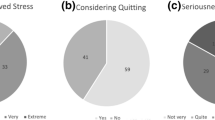Abstract
This paper examined the relationship between several exchange variables (organizational justice, organizational support, and psychological contracts) and organizational citizenship behavior (OCB) and in-role performance. The setting of this study was Arab teachers in Israel. Four-hundred and forty-six questionnaires were distributed in 13 Arab schools in the North of Israel. Usable questionnaires were returned by 291 teachers, a response rate of 65 %. OCB and in-role performance were reported by the principals of the schools. The findings using HLM showed a weak effect of organizational justice on the outcome variables, and a stronger effect of perceived organizational support and psychological contract breach. Some of the findings differ significantly from results typically found in Western samples. The findings are discussed in relation to the traditional Arab culture examined here.
Similar content being viewed by others
References
Adams, J. S. (1965). Inequity in social exchange. In L. Berkowitz (Ed.), Advances in experimental psychology (Vol. 2, pp. 267–299). San Diego: Academic.
Aggarwal, U., & Bhargava, S. (2010). Predictors and outcomes of relational and transactional psychological contract. Psychological Studies, 55, 195–207.
Ang, S., Van Dyne, L., & Begley, T. M. (2003). The employment relationships of foreign workers versus local employees: a field study of organizational justice, job satisfaction, performance, and OCB. Journal of Organizational Behavior, 24, 561–583.
Bateman, T. S., & Organ, D. W. (1983). Job satisfaction and the good soldier: the relationship between affect and employee citizenship. Academy of Management Journal, 26, 587–595.
Blader, S. L., & Tyler, T. R. (2005). How can theories of organizational justice explain the effects of fairness? In J. Greenberg & J. A. Colquitt (Eds.), Handbook of organizational justice (pp. 329–354). Mahwah: Lawrence Erlbaum.
Blalock, H. M. (1972). Social statistics. Tokyo: McGraw-Hill Kogakusha.
Brooke, P. P., Russell, D. W., & Price, J. L. (1988). Discriminant validation of measures of job satisfaction, job involvement and organizational commitment. Journal of Applied Psychology, 73, 139–145.
Bryk, A., & Raudenbush, S. (1992). Hierarchical linear models: Applications and data analysis methods. Newbury Park: Sage.
Cohen, A. (1999). The relation between commitment forms and work outcomes in Jewish and Arab culture. Journal of Vocational Behavior, 54, 371–391.
Cohen, A. (2006). The relationship between multiple commitments and organizational citizenship behavior (OCB) in Arab and Jewish culture. Journal of Vocational Behavior, 69, 105–118.
Cohen, A. (2010). Individual-level values and commitment: an empirical examination of Schwartz’s theory among Arab teachers in Israel. Journal of Applied Social Psychology, 40, 1921–1947.
Cohen, A. (2013). A global evaluation of organizational fairness and its relationship to psychological contracts. Career Development International, 18, 589–609.
Cohen-Charash, Y., & Spector, P. E. (2001). The role of justice in organizations: a meta-analysis. Organizational Behavior and Human Decision Processes, 86, 278–321.
Colquitt, J. A. (2001). On the dimensionality of organizational justice: a construct validation of a measure. Journal of Applied Psychology, 86, 386–400.
Coyle-Shapiro, J. A.-M. (2002). A psychological contract perspective on organizational citizenship behavior. Journal of Organizational Behavior, 23, 927–946.
Coyle-Shapiro, J. A.-M., & Conway, N. (2005). Exchange relationships: examining psychological contracts and perceived organizational support. Journal of Applied Psychology, 90, 774–781.
Coyle-Shapiro, J. A.-M., & Kessler, I. (2003). The employment relationship in the UK public sector: a psychological contract perspective. Journal of Public Administration Research and Theory, 13, 213–230.
Dalal, R. S. (2005). A meta-analysis of the relationship between organizational citizenship behavior and counterproductive work behavior. Journal of Applied Psychology, 90, 1241–1255.
DeVellis, R. F. (1991). Scale development: Theory and applications. Newbury Park: Sage.
Dulac, T., Coyle-Shapiro, J. A.-M., Henderson, D., & Wayne, S. (2008). Not all responses to breach are the same: a longitudinal study examining the interconnection of social exchange and psychological contract processes in organizations. Academy of Management Journal, 51, 1079–1098.
Eisenberger, R., Huntington, R., Hutchinson, S., & Sowa, D. (1986). Perceived organizational support. Journal of Applied Psychology, 71, 500–507.
Eisenberger, R., Armeli, S., Rexwinkel, B., Lynch, P. D., & Rhoades, L. (2001). Reciprocation of perceived organizational support. Journal of Applied Psychology, 86, 42–51.
Farh, J. L., Earley, P. C., & Lin, S. C. (1997). Impetus for action: a cultural analysis of justice and organizational citizenship behavior in Chinese society. Administrative Science Quarterly, 42, 421–444.
Greenberg, J. (1990). Organizational justice: yesterday, today, and tomorrow. Journal of Management, 16, 399–432.
Guest, D. E. (2004). The psychology of the employment relationship: an analysis based on the psychological contract. Applied Psychology: An International Review, 53, 541–555.
Haj Yahia, M. (1997). Toward culturally sensitive intervention with Arab families in Israel. Contemporary Family Therapy, 17, 429–447.
Hayes, A. F. (2009). Beyond Baron and Kenny: statistical mediation analysis in the new millenium. Communication Monographs, 76, 408–420.
Hayes, A. F. (2012). PROCESS: a versatile computational tool for observed variable mediation, moderation, and conditional process modeling [White paper]. Retrieved from http://www.afhayes.com/public/process2012.pdf.
Hui, C., Lee, C., & Rousseau, D. M. (2004). Psychological contract and organizational citizenship behavior in China: investigating generalizability and instrumentality. Journal of Applied Psychology, 89, 311–321.
Israel Central Bureau of Statistics. Selected findings. Retrieved October 18, 2011, from http://www.cbs.gov.il/reader/cw_usr_view_SHTML?ID=702.
Katz, D. (1964). The motivational basis of organizational behavior. Behavior Science, 9, 131–133.
Katz, D., & Kahn, R. L. (1966). The social psychology of organizations. New York: Wiley.
Lavelle, J. J., McMahan, G. C., & Harris, C. M. (2009). Fairness in human resource management, social exchange relationships, and citizenship behavior: testing linkages of the target similarity model among nurses in the United States. The International Journal of Human Resource Management, 20, 2419–2434.
LePine, J. A., Erez, A., & Johnson, D. E. (2002). The nature and dimensionality of organizational citizenship behavior: a critical review and meta-analysis. Journal of Applied Psychology, 87, 52–75.
Martin, C.L., & Bennett, N. (1996). The role of justice judgments in explaining the relationship between job satisfaction and organizational commitment. Group & Organization Management, 21, 84–104.
Mathieu, J. E., & Farr, J. L. (1991). Further evidence of the discriminant validity of measures of organizational commitment, job involvement, and job satisfaction. Journal of Applied Psychology, 76, 127–133.
Millward, L. J., & Hopkins, L. J. (1998). Psychological contracts, organizational and job commitment. Journal of Applied Social Psychology, 28, 1530–1556.
Moorman, R. H. (1991). Relationship between organizational justice and organizational citizenship behaviors: do fairness perceptions influence employee citizenship? Journal of Applied Psychology, 76, 845–855.
Niehoff, P. B., & Moorman, H. R. (1993). Justice as a mediator of the relationship between methods of monitoring and organizational citizenship behavior. Academy of Management Journal, 36, 527–556.
Organ, D. W. (1988). O.C.B.: the good soldier syndrome. Lexington: Lexington Books.
Organ, D. W., & Konovsky, M. (1989). Cognitive versus affective determinants of organizational citizenship behavior. Journal of Applied Psychology, 74, 157–164.
Organ, D. W., & Ryan, K. (1995). A meta-analytic review of attitudinal and dispositional predictors of organizational citizenship behavior. Personnel Psychology, 48, 775–802.
Piercy, N. F., Cravens, D. W., Lane, N., & Vorhies, D. W. (2006). Driving organizational citizenship behaviors and salesperson in-role behavior performance: the role of management control and perceived organizational support. Journal of Academy of Marketing Science, 34, 244–262.
Podsakoff, P. M., Mackenzie, S. B., Paine, J. B., & Bacharach, G. D. (2000). Organizational citizenship behaviors: a critical review of the theoretical and empirical literature and suggestions for future research. Journal of Management, 26, 513–563.
Podsakoff, N. P., Blume, B. D., Whiting, S. W., & Podsakoff, P. M. (2009). Individual- and organizational-level consequences of organizational citizenship behaviors: a meta- analysis. Journal of Applied Psychology, 94, 122–141.
Preacher, K. J., & Hayes, A. F. (2004). SPSS and SAS procedures for estimating indirect effects in simple mediation models. Behavior Research Methods, Instruments, & Computers, 36, 717–731.
Preacher, K. J., & Hayes, A. F. (2008). Asymptotic and resampling strategies for assessing and comparing indirect effects in multiple mediator models. Behavior Research Methods, 40, 879–891.
Raja, U., Johns, G., & Ntalianis, F. (2004). The impact of personality on psychological contracts. Academy of Management Journal, 47, 350–367.
Ramamoorthy, N., Flood, P. C., Slattery, T., & Sardessai, R. (2005). Determinants of innovative work behaviour: development and test of an integrated model. Creativity Innovation Management, 14, 142–150.
Restubog, S. D., & Bordia, P. (2006). Workplace familism and psychological contract breach in the Philippines. Applied Psychology: An International Review, 55, 563–585.
Rhoades, L., & Eisenberger, R. (2002). Perceived organizational support: a review of the literature. Journal of Applied Psychology, 87, 698–714.
Robinson, S. L., & Morrison, E. W. (2000). The development of psychological contract breach and violation: a longitudinal study. Journal of Organizational Behavior, 21, 525–546.
Rosen, C. C., Chang, C. H., Johnson, R. E., & Levy, P. E. (2009). Perceptions of the organizational context and psychological contract breach: assessing competing perspectives. Organizational Behavior and Human Decision Processes, 108, 202–217.
Rousseau, D. M. (1995). Psychological contracts in organizations: Understanding written and unwritten agreements. Thousand Oaks: Sage.
Semyonov, M. (1994). Trends in labor market participation and gender-linked occupational differentiation. In T. Mayer (Ed.), Women and the Israeli occupation (pp. 138–146). London: Routledge.
Sturges, J., Conway, N., Guest, D., & Liefooghe, A. (2005). Managing the career deal: the psychological contract as a framework for understanding career management, organizational commitment and work behaviour. Journal of Organizational Behavior, 26, 821–838.
Thomas, D. C., Au, K., & Ravlin, E. C. (2003). Cultural variation and the psychological contract. Journal of Organizational Behavior, 24, 451–471.
Tyler, T. R., & Blader, S. L. (2003). The group engagement model: procedural justice, social identity, and cooperative behavior. Personality and Social Psychology Review, 7, 349–361.
Viswesvaran, C., & Ones, D. S. (2002). Examining the construct of organizational justice: a meta-analytic evaluation of relations with work attitudes and behaviors. Journal of Business Ethics, 38, 193–203.
Westwood, R., Sparrow, P., & Leung, A. (2001). Challenges to the psychological contract in Hong Kong. International Journal of Human Resource Management, 12, 621–651.
Williams, L. J., & Anderson, S. E. (1991). Job satisfaction and organizational commitment as predictors of organizational citizenship and in-role behaviors. Journal of Management, 17, 601–617.
Zhao, H., Wayne, S. J., Glibkowski, B. C., & Bravo, J. (2007). The impact of PC breach on work-related outcomes: a meta-analysis. Personnel Psychology, 60, 647–680.
Author information
Authors and Affiliations
Corresponding author
Rights and permissions
About this article
Cite this article
Cohen, A., Eyal, O. The Role of Organizational Justice and Exchange Variables in Determining Organizational Citizenship Behavior Among Arab Teachers in Israel. Psychol Stud 60, 56–69 (2015). https://doi.org/10.1007/s12646-014-0286-2
Received:
Accepted:
Published:
Issue Date:
DOI: https://doi.org/10.1007/s12646-014-0286-2




